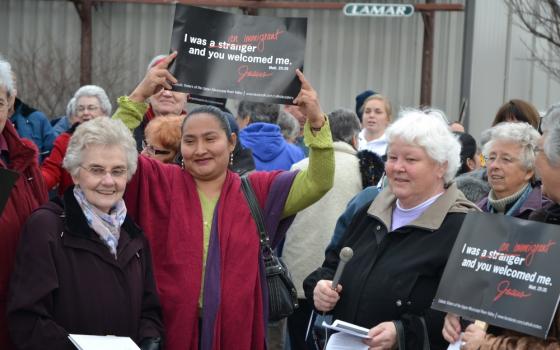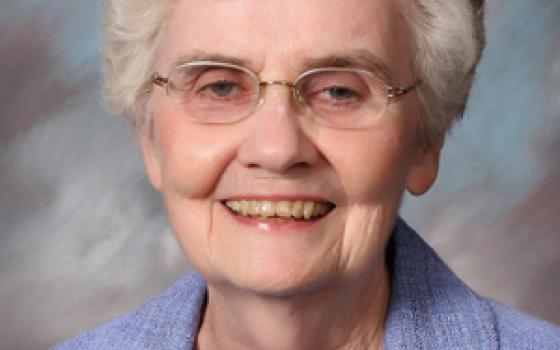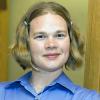Mary McCauley is a Sister of Charity of the Blessed Virgin Mary whose past ministries include serving as a high school principal, administering at the BVM nursing home, directing health care ministry for the archdiocese of Dubuque, Iowa, and serving in congregational leadership. In July 2003, Archbishop Jerome Hanus invited her to serve as pastoral administrator at three parishes, including St. Bridget's in Postville, a town of 2,200 people in northeast Iowa.
On May 12, 2008, Immigration and Customs Enforcement (ICE) carried out a raid at the Agriprocessors meatpacking plant in Postville and arrested and deported 389 undocumented workers from Mexico and Guatemala. McCauley describes the raid as a "transforming moment" that committed her to the Hispanic community and advocacy for comprehensive immigration reform. Though she formally retired from full-time ministry in the fall of 2008, McCauley remains an advocate and activist.
GSR: Can you describe your experience at St. Bridget's on the day of the ICE raid?
McCauley: Yes, vividly. The images and emotions are very strong in my mind and heart today. May 12, 2008, was the most challenging, exhausting and transformative day of my life.
Significant images: faces of desperate children searching for their parents. Faces of men and women with utter fright and anguish, wondering what happened to their arrested family members.
The families of those arrested came to St. Bridget's. I can still see the little boy who asked if his friends could come to church, too. I said, 'Tell anyone who is alone or afraid to come to St. Bridget's.' With that, we had over 400 people pouring into our church hall.
Another vivid memory: mothers who had been arrested and released with GPS devices on their ankles. At a march in Waterloo a few days later, they carried signs: 'We are not criminals. We came to work. We came to feed our families. We are mothers.' That image of those women standing up for their rights will stay with me forever. They are the Rosa Parkses of our broken immigration system.
Innumerable people from all over came to offer assistance. They brought food, clothing, games for the children. Such an outpouring of concern.
Family members of those who had been arrested would return to Mexico or Guatemala. They boarded a bus at St. Bridget's to go to Chicago O'Hare Airport. As the buses were loading, I hugged people and said goodbye. I remember saying to one man, 'I am so sorry that you have to leave, sorry for what happened to you at Agriprocessors, sorry for the way our country has treated you.' He looked at me and said, 'It's OK. I understand.'
That was a transformative moment. Because I don't think it's OK. I don't understand.
We received letters of support, sometimes with monetary donations. I also got hate mail from those who disapproved of what we were doing. One letter suggested we move our parish to Mexico if we loved the people so much. How sad that letter writer never got to know the people and their stories.
As a BVM sister, your community's core values are charity, justice, education and freedom. How is your ministry of advocacy for immigrants an embodiment of those values?
These values come from our BVM mission: to free ourselves and others in God's steadfast love. We get that spirit from our foundress, Mary Frances Clarke. She and four other women came from Ireland to educate immigrant children. So working with immigrants goes back to the founders of our community.
She was a great letter writer. From her compiled letters, we pick up her spirit, deep relationship with God, and our core values.
Charity is offering a benevolent, tender and sensitive response to all. The gift of love. In a letter, Clarke wrote, 'When you see a very poor and neglected little one, look on her with love.' I think of those words always.
Looking at freedom, I think of Jesus' words about Lazarus: 'Untie him and let him go free.' How do people need to be untied so they can be their best, most faithful selves, recognizing how much God loves them? We become free when we know that we are really loved. In Postville, I was trying to love people into freedom any way I could — through a hug, a toy, a sandwich, getting them to a lawyer or doctor. I was trying to untie them and let them go free.
Justice is recognizing dignity, equality and rights of all people.
How has your accompaniment of and advocacy on behalf of immigrants changed your spirituality and your understanding of God?
I've always seen God as very present, walking with us, caring about us, affirming and loving us. God is constantly at my side. My experience in Postville intensified my understanding of God and my desire to live the Gospel. It has increased my attentiveness to God's word, particularly Micah 6:8, 'to act justly, love tenderly, walk humbly with God.'
My spirituality is rooted in the Gospel. Scripture brings to light how we should be living. Certain passages are very alive to me. I think constantly of Isaiah 1:17, 'to make justice your aim.'
Another important passage is from Mark: 'He looked on him with love.' That connects to what Mary Frances Clarke said about looking on little ones with love.
In my prayer space, I have four significant pictures: first, a collage of family pictures. Both of my parents were concerned about justice issues. Second, an icon of Mary Frances Clarke. Third, a sketch depicting the day of the raid, done by a Postville High School senior. Fourth, a picture of Our Lady of Guadalupe. Those are the strong influences in my life.
What are the spiritual practices that nourish you for the long-haul work of advocating for justice for immigrants?
Fidelity to the daily Scripture readings and reflection on them in light of our core values.
About four years ago, after lots of talking about Postville, I was worn out. Immigration reform wasn't coming. I said, 'I think it's time for me to stop. It's exhausting me. Maybe it's time to focus on something else.' About two days after that, the day's reading was Acts 18, when Paul was imprisoned and discouraged and had a dream. God said to Paul, 'Do not be afraid. Do not be silent. And go on speaking.'
God is with us. As discouraging as it can be with legislation, we have to keep plodding along. Scripture and daily celebration of Eucharist keep me going. The body of Christ prays together in order to go out and serve. In a community of women religious committed to the Gospel, I get strength from my own sisters.
You have written about the need to turn the 'tragedy of Postville into victory for justice.' What does that 'victory for justice' look like?
Those are the words of Nobel Prize winner Rigobertu Menchu when she visited Postville.
We want comprehensive immigration reform. We don't want legal status without a path to citizenship. We emphasize family unity. I am concerned about detention centers and raids that break up families. Appropriate working conditions and labor rights are a concern. Another serious problem: We do not have enough lawyers. Immigrants need due process and legal counsel.
We need to look seriously at root causes. Why are people coming? I'm concerned about unaccompanied children coming as asylum-seekers from Central America because of gang violence. We should not be sending them back to situations where they could die.
We do need secure borders, but a border that respects the human dignity. Following Pope Francis: Let's build bridges, not walls.
Another statement of Mary Frances Clarke: 'Help, O Lord, poor Ireland, my dear country and bless dear America for her great charity for all.' My prayer today is that America might once again be known for her great charity for all. We have to open our hearts much wider.
[Rhonda Miska is a freelance writer in Dubuque, Iowa, and teaches religious studies at Clarke University. She is a candidate with the Dominican Sisters of Sinsinawa.]


